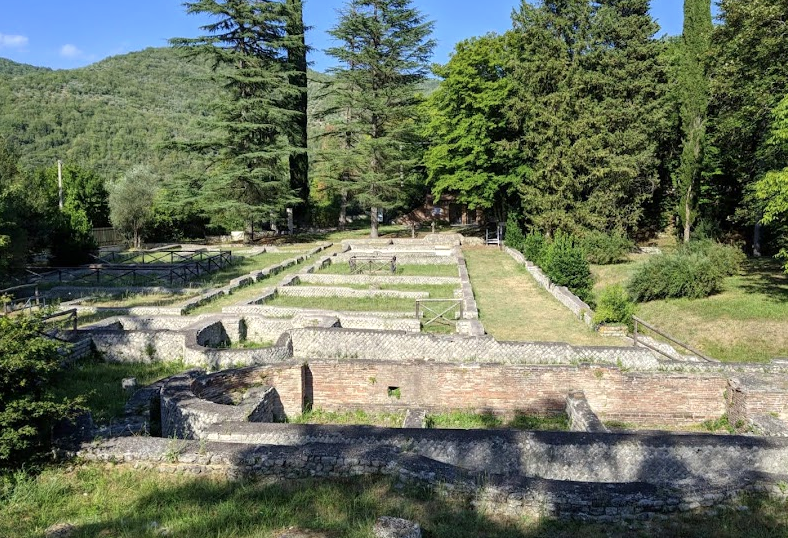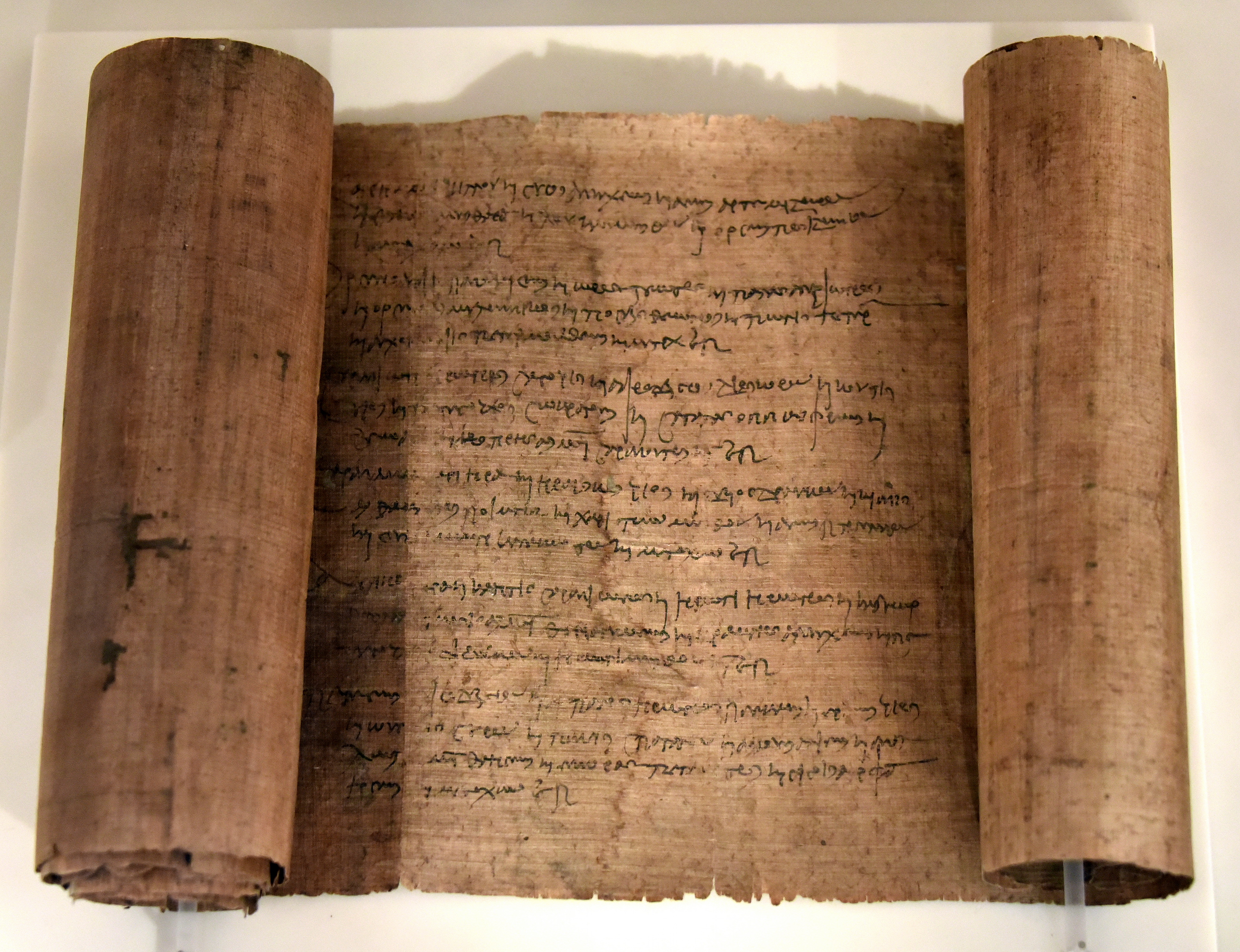CLAS 357
Horace (freedom/slavery in Satires, Epistles)
April 3, 2024

Bronnikov, Horatius Reads before Maecenas (1863)
Horace (65-8 BCE): born in Apulia; father a freed slave with social stigma (small landowner & auctioneer/debt collector); well-educated (Rome, Athens); in Athens Horace joins forces of Brutus & commands legion as tribune (pro-Republicans defeated, 42 BCE, Battle of Philippi);
Horace returns to Rome (41 BCE), pardoned & joins circle of Maecenas (ca. 38 BCE); Maecenas gives Horace farm in Tibur (modern Tivoli); farm becomes emblem of "modest" Epicurean life
Part I of tour of Horace's villa

Horace's villa (near Licenza, Italy)
- Satire 1.6: speaker defensive of status ("not having stuck to my own ass's skin", 1.6.22) & relationship with discerning Maecenas ("You don't turn your nose up, as most me do /At men of unknown birth, sons of freedmen like me", 1.6.5-6) – Maecenas' approval over "vulgar masses" (1.6.18)
Satire 1.6.54-64 (Horace's unambitious (?) rise)
It wasn’t luck indeed that revealed you to me: Virgil,
The best of men, and Varius, told you what I was.
Meeting you face to face, I stuttered a few words,
Mute diffidence preventing me saying more.
I didn’t claim to be born of a famous father,
Or rode a horse round a Tarentine estate,
I said what I was. You said little, as is your way,
I left: nine months later you recalled me, asking
Me to be one of your friends. And I think it’s fine
To have pleased you, who separate true from false,
Not by a man’s father but by his pure life and heart.
- combating stereotype of aggressive yet subservient social climber (lowly "son of a freedman"); grounded character?
Satire 1.6.71-80 (his father's role, blessing of low-birth?)
It’s due to my father, who though poor, on poor land,
Wouldn’t send me to Flavius’ school, where fine lads,
The sons of fine centurions went with their tablets
And satchel hanging from their left shoulders, carrying
Their eight coins as fee on the Ides of each month,
But instead he bravely whisked his son off to Rome,
To be taught the skills senator or knight would expect
To be taught his son. And if anyone noticed my clothes
And attendants, a big city scene, he’d have thought
The expenses were being met from ancestral wealth.
- social visibilty: charges of ambition ("Who's this fellow, Who was his dad?", 1.6.29)
Satire 1.6.98-109 (Horace's display of modest contentment)
I’d not want parents blessed with rods and thrones.
The crowd would think me mad, you sane perhaps,
For not wishing to carry an unaccustomed burden.
I’d be forced at once to acquire more possessions,
Welcome more visitors, take one or two companions
So as not to travel or visit the countryside alone,
Keep more horses and grooms, take a wagon-train,
While now I can ride on a gelded mule to Tarentum,
Its flanks galled by a heavy pack, withers by the rider:
No one will call me vulgar, Tillius the praetor,
As they do you, when five slaves, on the Tibur road,
Follow behind you with a chest, and a case of wine.

The Simple Life (2007)
- conclusion (1.6.110-31): daily routine & nature of his freedom? ("Three lads serve my supper" . . . This is the life / Of those relieved of the weight of wretched ambition", 1.6.116ff.; forging a new social identity? Epicurean aloofness from ambition & politics
- is Horace/the satire's speaker truly free? enslaved to anything?

Callet, Saturnalia (1783)
- Satire 2.7: Horace's slave Davus given license to speak freely during Saturnalia & unloads
Satire 2.7.23-43 (exposing his master's hypocrisy)
"You praise the good luck and manners of men of old,
But if some god suddenly urged you to visit that era,
You’d refuse every time, ‘cos you don’t really believe
What you praise was better, or else ‘cos you’re not firm
In defence of what’s true, sticking fast in the mud while
Vainly struggling to get free. In Rome you yearn for the fields:
Once there, waverer, you laud the far town to the skies.
If by chance you’re not asked out to dinner you praise
Cabbage in peace, call yourself happy and hug yourself
For not partying, as if you’d have to be forced to go.
But Maecenas sends you a late invitation at twilight,
And you scream: 'Where’s the lamp-oil? Quick, are you
Deaf?' at the top of your voice, then off you scurry.
Mulvius and your other hangers-on disperse, [Mulvius a parasite]
With unmentionable curses aimed your way. He says,
'I’m easily goaded on by my belly, it’s true, nostrils
Twitching at savoury smells, weak, spineless, a glutton
Too, if you wish, but since he’s just the same or worse,
What cause has he to criticise me, and cloak his vices
In decorous words' What if you’re more foolish than me,
Who cost you five hundred!" [500 drachmas = 5 minae; skilled laborer makes 1 drachma/day in Athens]

Biondi, Saturnalia (Buenos Aires, 1899)
- Stoic philosophy from doorkeeper of Crispinus: Stoic paradox, "only the wise man is free, and every fool is a slave"; freedom a mental & moral condition, not legal status; true freedom = mastery of desire, self-mastery & absence of fear
Satire 2.7.46ff. (who's the real slave? Horace's dangerous & degrading vices)
‘Another man’s wife tempted you: a whore caught Davus.
Which of our sins more deserves the gallows?
. . . While when you’ve shed your badges of rank, your knight’s ring,
Your Roman clothes, and no longer a worthy, step out
As Dama the servant, hiding your perfumed hair
Under a cowl, aren’t you the slave you pretend to be?
Anxious, you gain admittance, body trembling with fear
That vies with your lust. What matter whether you sell yourself
To be seared by the lash, killed by the sword, or are shut
Shamefully in her mistress’ chest by a knowing maid,
Cowering, with head between your knees?
. . . Are you my master, ruled by so many
Men and things? Touched by the rod three times, four times, [vindicta ceremony]
It will never release you from your miserable fears.
. . . Wretch, you who order me around serve another,
Like a wooden puppet jerked by alien strings.
So who is free? The wise man: in command of himself,
Unafraid of poverty, chains, or death, bravely
Defying his passions, despising honours, complete
In himself, smoothed and rounded, so that nothing
External can cling to his polished surface, whom
Fortune by attacking ever wounds herself. Can you
Claim any of this for your own?

Dice players (fresco, Pompeii)
- conclusion: slave vs. master?
Satire 2.7.102-15
. . . If I’m tempted by hot pastry, I’m good-for-nothing:
But does your great virtuous mind turn down fine dinners?
Why is it worse for me to be slave to my belly?
Because my back pays? But do you escape scot-free,
Attracted by delicacies that no small sum will buy?
Dinners endlessly pursued only turn to bitter aching,
And overtaxed legs refuse to carry your swollen
Body. Is the slave who trades a stolen bath-brush
For grapes, at nightfall, guilty? Then is he not slave-like
Who sells his estates to serve his gullet? Add that you
Can’t bear an hour in your own company, or employ
Your leisure usefully, that you evade yourself
Like a fugitive, a vagabond, trying to cheat Care
With sleep or wine.
- Horace's long-awaited response?

- Epistle 1.10: contrast with city-loving friend Fuscus ("If we all should live in conformity with Nature, / And begin by choosing a site to build a house, / Do you know anywhere better than the country?", 1.10.12-14);
different lifestyles, benefits, morality, true freedom only in country?
Epistle 1.10.34-43 (fable of the stag and the horse)
The stag could always better the horse in conflict,
And drive him from open ground, until the loser
In that long contest, begging man’s help, took the bit:
Yet, disengaged from his enemy, as clear victor,
He couldn’t shed man from his back, the bit from his mouth.
So the perverse man who forgoes his freedom, worth more
Than gold, through fear of poverty, suffers a master
And is a slave forever, by failing to make much
Of little. When a man’s means don’t suit him it’s often
Like a shoe: too big and he stumbles, too small it chafes.

List of laborers' names on Greek papyrus (Faiyum, Egypt, ca. 200 CE)
- Epistle 1.20: last poem of Book 1; book figured as uerna ("household slave") being manumitted; book/slave venturing out independently – what happens to poetry once in hands of public/readers? ("You'll be dear to Rome till your youth deserts you", 1.20.10)
Epistle 1.20.17-28 (closure)
And this fate awaits you: mumbling old age will overtake
You, teaching little boys to read on the street-corner.
When a warmer sun attracts a few more listeners,
You’ll tell them I was a freedman’s son, that, of slender
Means, I spread wings that were too large for my nest,
And though my birth lessens them, you’ll add to my merits:
Say, in war and peace, I found favour with our leaders,
Was slight of frame, grey too early, fond of the sun,
Quick-tempered, yet one who was easy to placate.
If anyone happens to ask about my age,
Tell him I completed my forty-fourth December,
When Lollius, as consul, was joined by Lepidus.







